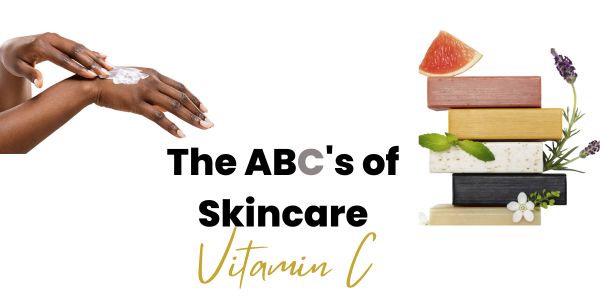
What are Vitamins?
The letter “C” in ABCs will focus on Vitamin C benefits. This is a 3-part series focused on the ABCs of Skincare. This blog post will be the second topic in this series. If you have stumbled across another ABCs of skincare and it is not the first or second post, please go back and begin with “A.”
As many of you already know, vitamins are essential to life. They contribute to good health by regulating metabolism and assisting the biochemical processes that release energy when we digest food. They are considered micronutrients because our body needs them in relatively small amounts compared to macronutrients which are carbohydrates, fats, protein, and WATER.
What does Vitamin C do for the body?
As a Nutritionist, I learned that Vitamin C is an essential nutrient that is responsible for at least 300 metabolic functions in the body. This includes helping the body maintain healthy skin, bones, blood vessels, and healthy gums. Vitamin C also assists the body in the absorption of Iron from plant sources. I think many people are aware of Vitamin C because of the role it plays in the immune system.
Vitamin C is well known for helping the body fight off infections and diseases. I know you have heard people say, “Eat foods that have vitamin C if you have a cold.” This holds true (to a certain degree) as Vitamin C is the POWERHOUSE in fighting the duration or frequency of colds. Vitamin C is also responsible for assisting in wound healing (with the help of Zinc). Additionally, vitamin C acts as an antioxidant, protecting the body from damage caused by harmful molecules known as free radicals.
The body can’t make vitamin C by itself; therefore, you must get it from your diet or supplements. When I was in school, we were told about some sailors who were traveling amongst the seas who had swollen gums, loose teeth, hair loss, and a rash that looked like red spots. These were, as we know today, deficiencies of Vitamin C. Unfortunately, over one hundred years ago, there was a lack of fresh fruit and vegetables in the diets of sailors that caused this deficiency. Sailors would suck on lemons and limes in order to prevent scurvy and got the nickname Limeys.
Some sources of Vitamin C are berries, citrus fruits, avocados, broccoli, brussels sprouts, cantaloupe, collards, grapefruit, kale, mangos, lemons, limes, oranges, apples, onions, papayas, green peas, sweet peppers, bell peppers, pineapples, radishes, strawberries and much more. If you are into herbs, there are some herbs that contain Vitamin C. They are peppermint (my favorite), fennel, fenugreek, burdock root, cayenne, and more.
What can Vitamin C do for the skin?
In addition to maintaining a healthy immune system, Vitamin C helps the skin in many ways, it:
- Slows early signs of aging
- Prevents sun damage
- Improves hyperpigmentation & acne
- Brightens skin
- Improve the appearance of wrinkles
- Promotes collagen production
- Helps to heal the skin (along with Zinc)





